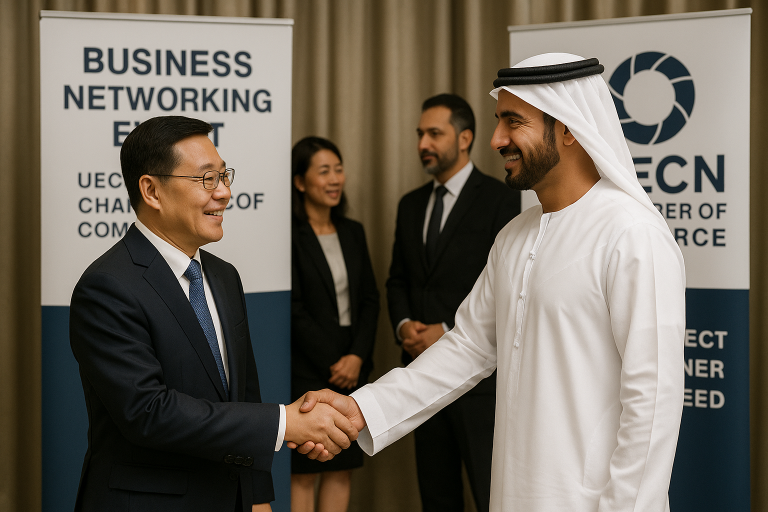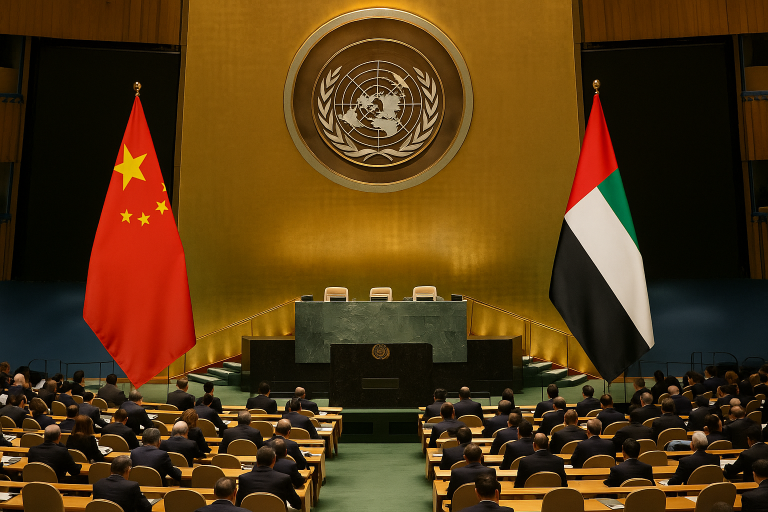The UAE: The Premier Regional Hub for Chinese Business
Introduction
More than 6,000 Chinese companies call the United Arab Emirates home. This powerful statistic is more than just a number; it is a resounding testament to a deliberate and brilliantly executed strategy that has positioned the UAE as the undisputed gateway for Chinese enterprises seeking to expand into the vast and dynamic markets of the Middle East, Africa, and beyond. The UAE is not merely a location on a map for these businesses; it is a strategic platform, a safe harbor, and a powerful springboard for growth. This success has been built on an unparalleled combination of world-class infrastructure, a secure and exceptionally business-friendly environment, deep market access, and a genuine spirit of partnership. This article delves into the core components of the UAE’s success as the premier regional hub for Chinese business, exploring its fundamental value proposition, the critical role of its supportive ecosystem, and its ongoing evolution from a hub for trade to a hub for innovation.
The Core Value Proposition: Why the UAE?
The decision for thousands of companies, from state-owned giants to nimble startups, to choose the UAE as their regional base is rooted in a clear and compelling value proposition built on four unshakable pillars.
First is its unbeatable strategic location. Situated at the geographical crossroads of Europe, Asia, and Africa, the UAE offers effortless access to a vast economic hinterland. A significant portion of the world’s population and many of its fastest-growing emerging markets are just a few hours’ flight away. This proximity minimizes travel time, reduces shipping costs, and allows companies based in the UAE to remain closely connected to their customers and partners across three continents.
Second is its world-class infrastructure. The UAE has invested billions in creating a logistics and transportation network that is second to none. Jebel Ali Port in Dubai is one of the largest and most efficient container ports in the world, with a shipping network that connects to over 150 ports globally. The country’s international airports in Dubai (DXB) and Abu Dhabi (AUH) are consistently ranked among the world’s busiest for both passenger and cargo traffic. Critically, these assets are linked by seamless, multi-modal logistics corridors that allow goods to move from sea to air to road with incredible speed and efficiency, a crucial advantage for any business managing a regional supply chain.
Third, in a region that can be characterized by volatility, the UAE stands out as a beacon of stability and security. Its long-standing political stability, its safe and cosmopolitan cities, and its clear, long-term economic vision provide a predictable and secure environment where businesses can invest with confidence. The pro-business stance of the government is not just a slogan; it is reflected in policies that are consistently designed to attract investment, foster growth, and reduce bureaucratic hurdles.
Finally, the favorable financial and legal framework provides a powerful competitive advantage. For most businesses operating in the country, the financial incentives are compelling: a 0% corporate tax rate, no income tax, and the freedom to repatriate 100% of profits without restriction. The UAE Dirham’s peg to the US Dollar provides currency stability, eliminating exchange rate risk for international transactions. This is complemented by a robust and transparent legal system. The presence of independent, common-law financial free zones like the Dubai International Financial Centre (DIFC) and the Abu Dhabi Global Market (ADGM) provides a legal framework that is familiar and trusted by international corporations, offering the highest standards of dispute resolution and regulatory oversight.
The Ecosystem of Support: Free Zones as a Springboard
Central to the UAE’s strategy for attracting foreign investment is its extensive network of specialized free zones. These zones are the engine of the hub model, providing a highly supportive ecosystem that acts as a springboard for international companies. The key advantage of operating within a free zone is the ability to retain 100% foreign ownership, bypassing the need for a local partner. This is coupled with simplified and rapid company setup procedures, streamlined customs processes, and access to pre-built, high-quality infrastructure like offices, warehouses, and manufacturing facilities.
Jebel Ali Free Zone (JAFZA) is the quintessential example and the largest free zone in the region. It serves as the operational base for thousands of Chinese companies, particularly those in the trading and logistics sectors. A typical Chinese company might import dozens of containers of goods from China into JAFZA, use its advanced warehousing facilities to store the inventory, and then efficiently distribute these products in smaller quantities to customers across the Middle East and North Africa (MENA). This model allows them to benefit from economies of scale in shipping while providing rapid delivery to their regional clients.
Another key hub is the Dubai Multi Commodities Centre (DMCC), which has become a major center for Chinese companies involved in the global commodities trade, from precious metals to agricultural products. Beyond commodities, its flexible setup options and central location have attracted a diverse range of Chinese service-oriented businesses. In this thriving ecosystem, the UAE China Chamber of Commerce (UECN) plays a crucial and active role. It functions as a vital facilitator and advocate, providing essential market intelligence, creating high-level networking platforms, and offering business matchmaking services that connect new Chinese entrants with potential local partners, distributors, and customers. The UECN is the trusted guide that helps Chinese companies navigate the local business landscape and unlock the full potential of the UAE hub.
From Tech Giants to Traders: Case Studies of Success
The diversity of Chinese companies thriving in the UAE is a testament to the hub’s broad appeal. The country is home to the regional headquarters of China’s most prominent technology corporations. Giants like Huawei, Tencent, and Alibaba Cloud have all established a major presence in the UAE, particularly in Dubai. They use this base not just for sales and marketing, but for managing their complex operations across the entire Middle East and Africa. It is from their UAE headquarters that they run technical support centers, forge strategic partnerships with regional governments and businesses, and develop solutions tailored to local market needs.
At the other end of the spectrum are the thousands of small and medium-sized Chinese trading companies that form the commercial backbone of the relationship. These agile enterprises have leveraged Dubai’s vibrant wholesale markets, such as the famous Dragon Mart—the largest Chinese trading hub outside of mainland China—as a platform to trade a vast and diverse array of goods. They have created a critical link in the supply chain, connecting Chinese manufacturers with the burgeoning consumer markets of the Middle East and, increasingly, Africa.
The Future: A Hub for Innovation and Expansion
The role of the UAE as a hub is in a constant state of evolution. While its traditional strengths in logistics and trade remain foundational, it is rapidly transforming into a center for R&D, innovation, and high-value services. There has been a significant influx of Chinese companies in emerging sectors like Financial Technology (FinTech), Artificial Intelligence (AI), e-commerce, and gaming, all drawn by the UAE’s excellent digital infrastructure and its focus on building a knowledge-based economy.
Furthermore, the UAE’s importance as the gateway to Africa is growing exponentially. For Chinese companies looking to tap into the high-growth, high-potential markets of the African continent, the UAE offers the perfect launchpad. Its unparalleled air connectivity to cities across Africa, its sophisticated financial and banking services that can mitigate the risks of doing business in emerging markets, and its political stability make it a far safer and more efficient base of operations than a location on the continent itself. It is from Dubai that many Chinese firms manage their African investments, deploy their teams, and run their supply chains.
Conclusion: The Partner in Growth
The United Arab Emirates has created a compelling and comprehensive ecosystem that has rightfully earned it the title of the premier regional hub for Chinese business. Its success is built on the solid pillars of strategic location, superior infrastructure, unwavering stability, and a deeply supportive, business-friendly environment. The relationship is truly symbiotic: the UAE’s continued success as a global business hub is now intrinsically linked to the growth and prosperity of the thousands of Chinese companies it hosts, and their success is magnified by the world-class platform the UAE provides. Ultimately, the UAE is more than just a convenient location for Chinese business; it is a committed and long-term partner in their global growth, providing the tools, the platform, and the unwavering stability they need to compete and thrive in a complex and interconnected world.







